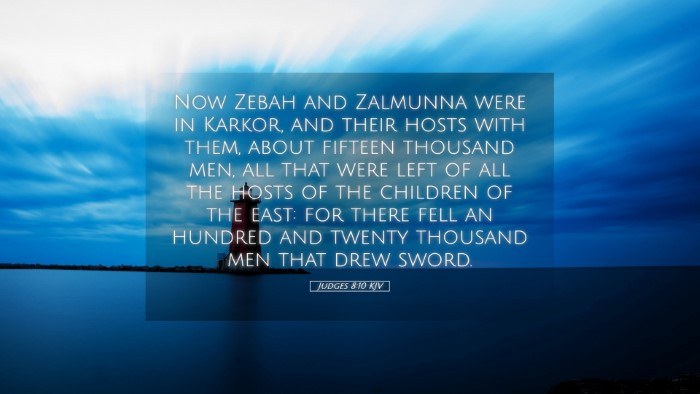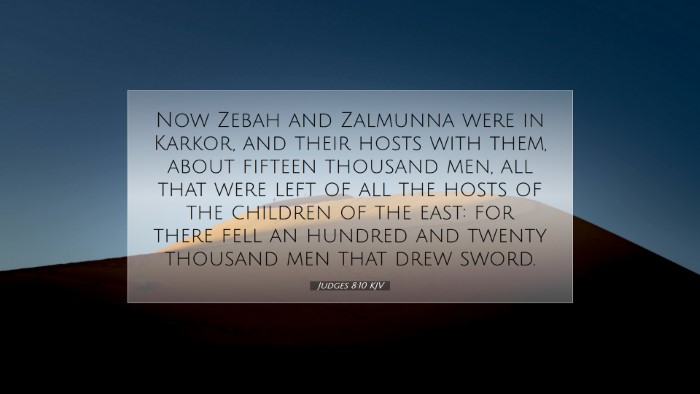Bible Commentary on Judges 8:10
Judges 8:10 states: "Now Zebah and Zalmunna were in Karkor, and their hosts with them, about fifteen thousand men; all that were left of all the hosts of the children of the east: for there fell an hundred and twenty thousand men that drew sword."
Context and Historical Background
This verse appears within the narrative of Gideon's campaign against the Midianites. It highlights the dire situation of the Midianite kings, Zebah and Zalmunna, as they find themselves significantly outnumbered following the defeat of their forces. A contextual understanding of this verse is crucial, as it illustrates God's deliverance for Israel through Gideon, demonstrating His sovereignty and power.
Insights from Matthew Henry
Matthew Henry emphasizes God's providence as evident in the significant victory obtained by Gideon and his men. He notes that the fragility of the enemy forces and their reduced numbers illustrate that God can triumph over overwhelming odds. Specifically, Henry notes:
- The Numbering of the Enemies: The comparison of the numbers highlights how God reduced the Midianites down to a desperate remnant, showing His hand in the victory.
- Divine Intervention: Henry points out the impossibility of such a decisive victory without divine intervention, illustrating the theme of faith in God’s power.
- Symbol of Judgment: The death of 120,000 men serves as a representation of God’s judgment against those who oppose His people.
Insights from Albert Barnes
Albert Barnes provides an analytical view of the text, focusing on the implications of the conflict:
- Strategy in Warfare: Barnes stresses that Gideon's wisdom in pursuing his enemies reflects a strategic military mindset that relies on faith rather than mere numbers.
- The Severity of War: The staggering figure of fallen soldiers serves as a somber reminder of the cost of conflict and the seriousness of God’s command against idolatry and oppression.
- Sign of Deliverance: The passage illustrates the theme of deliverance; the near annihilation of the Midianite forces signifies God’s desire to liberate His people from oppression.
Insights from Adam Clarke
Adam Clarke adds a richer historical perspective to the text, drawing parallels and offering deeper theological reflections:
- Cultural Context: Clarke elaborates on the cultural and historical significance of the Midianites’ defeat, tying it to Israel's ongoing struggle against oppressors.
- Symbol of God’s Power: The numerical defeat serves as a demonstration of God's might; Clarke underscores that such victories should inspire faith among the Israelites, reinforcing their commitment to God.
- Restoration of Israel: He argues that the victory over Zebah and Zalmunna was a critical step toward the restoration of Israel’s autonomy and identity.
Theological Reflection
Judges 8:10 encapsulates significant themes relevant for contemporary application:
- God’s Sovereignty: The text reaffirms the belief that God orchestrates the outcomes of human conflicts in alignment with His divine purposes.
- Faith Amidst Adversity: The narrative encourages believers to maintain faith even in circumstances that appear insurmountable.
- Moral and Ethical Implications: It serves as an admonition against idolatry and the consequences of turning away from God's commandments.
Conclusion
Judges 8:10 presents a pivotal moment in Israel’s history, one that illustrates profound theological themes through the lens of God’s unwavering support for His people. It serves not only as a historical account but also as an encouragement to modern believers to recognize God’s providence in their own lives.


